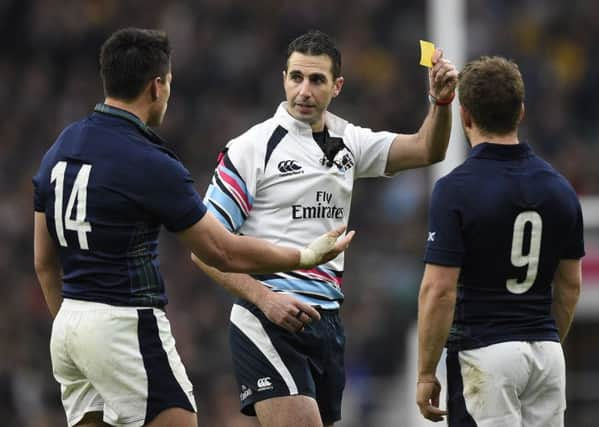World Rugby: Scotland v Australia referee was wrong


The Wallabies clinched a dramatic 35-34 victory in the Rugby World Cup quarter-final at Twickenham on Sunday when stand-off Bernard Foley was on target with 43 seconds remaining. But World Rugby said in a statement that having reviewed the incident, the “appropriate decision was a scrum to Australia for the original knock-on” and not a penalty.
The decision, which has attracted widespread criticism from former players of various nationalities, ended Scotland’s magnificent challenge against the tournament second-favourites in which a late try by Mark Bennett threatened to secure a famous and stunning victory.
Advertisement
Hide AdAdvertisement
Hide AdWhile accepting Joubert got the call wrong, the review clarified that there was no recourse to the Television Match Official under the protocols. And the truth is that the ruling will provide scant consolation to Vern Cotter and his players, who were so cruelly denied a place in the World Cup semi-finals.
There was also no mention in the review of the fact that Joubert ran off the field immediately after the final whistle rather than remain and shake hands with both sets of players. This further angered many observers who saw it as a breach of the spirit of the game, with former Scotland captain Gavin Hastings describing it as “the worst thing I have seen on a rugby field for a long time”.
The drama played out after Bennett’s intercept try and skipper Greig Laidlaw’s conversion put Scotland 34-32 up with minutes remaining. A messy Scottish lineout led to the ball bouncing around before sub prop Jon Welsh gathered. Joubert ruled it offside and awarded the kickable penalty. But the World Rugby statement said: “The committee confirms that Joubert applied World Rugby Law 11.7 penalising Scotland’s Jon Welsh, who had played the ball following a knock-on by a team-mate, resulting in an offside. On review of all available angles, it is clear that after the knock-on, the ball was touched by Australia’s Nick Phipps and Law 11.3(c) states that a player can be put onside by an opponent who intentionally plays the ball.
“It is important to clarify that, under the protocols, the referee could not refer to the television match official in this case and therefore had to rely on what he saw in real time.
“In this case, Law 11.3(c) should have been applied, putting Welsh onside. The appropriate decision, therefore, should have been a scrum to Australia for the original knock-on.”
There were other controversial moments in a breathtaking match, including the seemingly harsh decision to sin-bin Scotland wing Sean Maitland for what the TMO adjudged a deliberate knock-on. The Scots conceded a try in Maitland’s corner while he was off the field.
There was also, just prior to the dramatic final lineout, what appeared to be a late hit by Wallaby wing Drew Mitchell on Scotland full-back Stuart Hogg which, if highlighted by the TMO, could have seen the game out for Scotland. The SRU made no comment last night.
It would appear that, like the Scots, Joubert’s tournament is now over after confirmation that English referee Wayne Barnes and Frenchman Jerome Garces have been awarded the semi-final ties at Twickenham.
Advertisement
Hide AdAdvertisement
Hide AdGarces will take charge of Saturday’s South Africa-New Zealand clash with his countryman Romain Poite and Ireland’s John Lacey appointed as assistant referees.
Barnes will referee Argentina v Australia on Sunday, assisted by South African Jaco Peyper and Irishman George Clancy, leaving Wales’ Nigel Owens favourite for the final at Twickenham on 31 October.
READ MORE